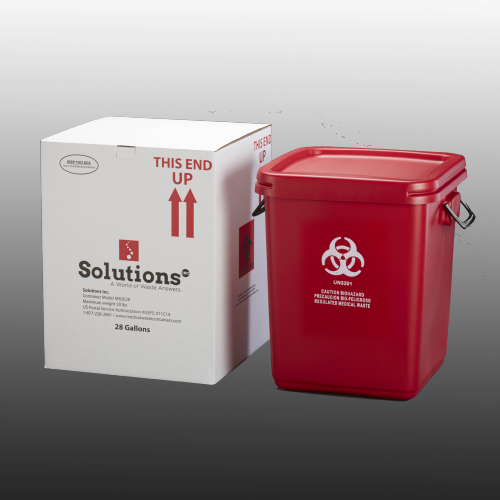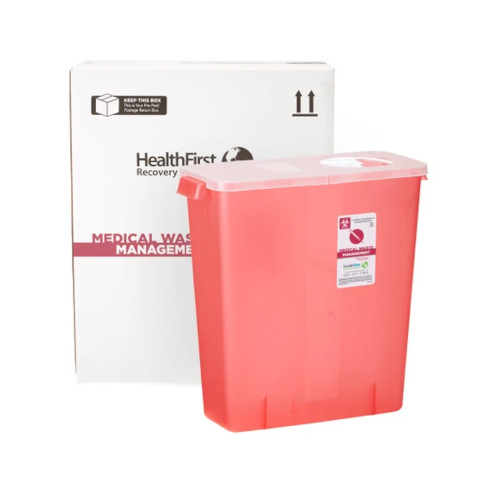Effective Medical Waste Disposal Services: Guarding Your Center's Health
Effective Medical Waste Disposal Services: Guarding Your Center's Health
Blog Article
Navigating Medical Garbage Disposal: Necessary Services for Medical Care Facilities
Health care centers, whether little clinics or huge medical facilities, are turned over with the responsibility of handling, dealing with, and disposing of a large array of clinical waste streams. Comprehending the important solutions that support clinical waste disposal is not just a matter of conformity yet additionally a fundamental element in securing public wellness and environmental health.
Regulatory Conformity Assistance
For healthcare facilities, making certain governing conformity support is necessary to preserve proper handling and disposal of medical waste. Sticking to regulations established forth by organizations such as the Epa (EPA) and the Occupational Safety And Security and Wellness Management (OSHA) is crucial to avoid environmental contamination, shield public health, and avoid possible legal repercussions. Regulative compliance assistance gives health care facilities with assistance on how to properly segregate, store, transport, and get rid of various types of clinical waste in accordance with regional, state, and federal regulations. This assistance includes aid in creating and applying thorough waste monitoring plans, carrying out regular personnel training sessions, and performing audits to ensure continuous conformity. By partnering with regulatory compliance specialists, healthcare centers can remain up-to-date on progressing guidelines, minimize risks connected with improper garbage disposal, and inevitably add to a more secure and much more sustainable environment for all.
Waste Partition Assistance

Medical care facilities should supply clear standards and training to team on just how to segregate waste properly. This includes dividing general waste from hazardous materials such as sharps, transmittable waste, pharmaceuticals, and chemical waste. Color-coded containers, tags, and signs are typically utilized to assist in waste segregation methods. Normal audits and tracking of waste segregation procedures are necessary to determine any type of concerns and make essential renovations.
Collection and Transportation Solutions

Correct collection and transport solutions are necessary parts of the clinical garbage disposal process in medical care centers. These solutions make sure that hazardous materials are handled safely and in conformity with policies to safeguard both the setting and public wellness. Medical care facilities depend on specialized waste administration business to offer effective collection and transport solutions customized to their requirements.
Medical waste collection involves segregating various kinds of waste at the point of generation, using color-coded bags or containers to identify between general, unsafe, pharmaceutical, and other waste streams. Educated workers should perform this job to stop contamination and make sure correct disposal. When accumulated, the waste is delivered in specialized vehicles equipped to take care of hazardous materials securely. These vehicles stick to strict safety and security requirements and comply with assigned paths to certified treatment centers for disposal via methods such as incineration, sterilization, or landfilling.
Therapy and Disposal Solutions
In the realm of medical waste disposal for health care facilities, after the crucial stage of collection and transport services, the focus moves towards executing efficient treatment and disposal services. Treatment options usually involve processes such as autoclaving, which uses heavy steam under pressure to decontaminate the waste. This method is commonly used for transmittable waste that needs to be provided non-hazardous prior to disposal. An additional widespread therapy approach is incineration, where waste is subjected to high temperatures in regulated settings to reduce its quantity and eliminate pathogens.
Disposal solutions include the last action in the clinical waste administration process. Reusing and source healing are also gaining grip as lasting disposal alternatives for particular kinds of clinical waste materials.
Effective therapy and disposal services are extremely important in making certain compliance with guidelines and protecting public health and wellness and the environment. Healthcare Clicking Here centers must meticulously evaluate and select suitable methods that straighten with their waste monitoring objectives and sustainability efforts.
Staff Training and Education And Learning

To efficiently take care of clinical waste disposal in medical care facilities, extensive team training and education play an important duty in making certain adherence to regulatory demands and maintaining a risk-free setting. Correct training equips team with the knowledge and skills needed to take care of different kinds of medical waste, segregate them properly, and package them securely for disposal. By educating staff members on the risks related to improper handling of clinical waste, centers can minimize the possibility of mishaps, contamination, and governing infractions.

Conclusion
To conclude, medical care centers depend on necessary medical garbage disposal services to make sure regulatory conformity, proper waste segregation, secure collection and transport, effective treatment and disposal, as well as personnel training and education. These solutions play a vital role in keeping the wellness and safety and security of both health care employees and the basic public, highlighting the importance of appropriate over at this website administration of clinical waste in medical care setups.
For health care facilities, making certain regulative compliance assistance is necessary to preserve correct handling and disposal of medical waste. Waste partition includes classifying different kinds of clinical waste to guarantee proper handling, therapy, and disposal. This includes dividing general waste from dangerous products such as sharps, transmittable waste, drugs, and chemical waste.Clinical waste collection involves segregating various kinds of waste at the point of generation, making use of color-coded containers or bags to distinguish in between basic, harmful, pharmaceutical, and various other waste streams.In the world of clinical waste disposal for healthcare centers, find more after the important phase of collection and transport services, the emphasis shifts in the direction of implementing reliable treatment and disposal solutions.
Report this page